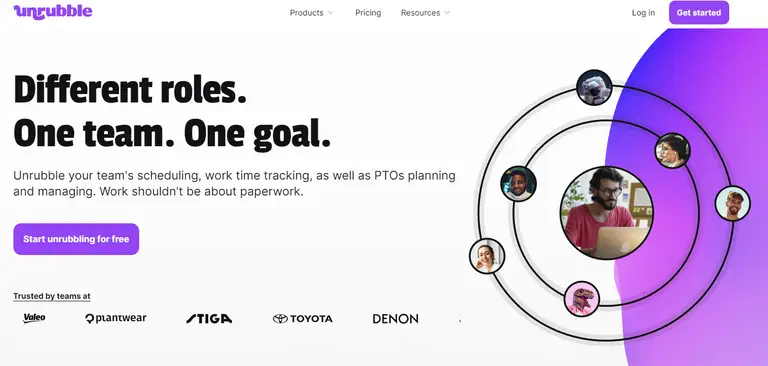Are you ready to turbocharge your work life with some killer goals? Look no further!
In this article, we've compiled a list of work goal examples that will have you inspired and ready to conquer the professional world like a boss.
Read on and unlock your inner ninja of productivity!
What are work goals?
Work goals are specific objectives that individuals or teams aim to achieve within a defined timeframe.
They provide focus, direction, and motivation, guiding efforts toward desired outcomes. Work goals can be related to productivity, skill development, project completion, career advancement, or any other aspect of professional growth.
Why do work goals matter?
Both employees and employers should set work goals for themselves as it can be beneficial for both sides.
Commitment to company
First things first, company commitment comes far easier. Thanks to having work goals, you can feel a sense of commitment to the company you work for or run. Such clear goals give people a sense of purpose and direction, making them more invested in the success of the organization.
Job satisfaction
Research has shown that people who have established goals tend to enjoy their jobs more. The fact that individuals have specific targets to work towards provides a feeling of achievement and fulfillment. This job satisfaction not only benefits the employee but also creates a positive work environment.

Growth opportunities
Setting work goals allows employees to identify areas where they want to improve and acquire new skills. When workers have goals, they are more likely to seek out opportunities for growth and development within their company. This can lead to increased job satisfaction. And let’s not forget about a more skilled and valuable workforce.
Increased engagement
Whenever employees have goals that align with their personal aspirations, it creates a sense of purpose and motivation. As such, it leads to increased engagement. And this higher level of engagement can positively impact productivity and overall performance.
How to set work goals?
You can set your first work goals now in these 6 easy steps:
Step 1: Find your values
Take some time to reflect on what truly matters to you in your work. Consider aspects such as personal growth, impact, collaboration, or autonomy. Understanding your values will help you align your goals with what is most important to you.
Step 2: Think about your ideal role
Envision where you want to be in your career. What responsibilities, skills, or achievements do you aspire to? When you visualize your desired professional future, you can gain clarity and direction for setting your goals.
Step 3: Write down your work goals
Transform your aspirations into professional goals by making them specific, measurable, achievable, relevant, and time-bound (SMART goals). Writing them down not only clarifies your intentions but also solidifies your commitment to them. Break your goals into smaller, actionable steps to make them more manageable.
Step 4: Prioritize and strategize
Determine which goals are most important to you and prioritize them accordingly. Divide your goals into short-term and long-term objectives. Develop an action plan that outlines clear steps, timelines, and the resources you need to achieve each goal. This strategic approach will help you stay organized and focused.

Step 5: Take action
Once you have your goals and action plan in place, it's time to take the first step. Dive into your tasks and projects with determination. Stay focused on your objectives, track your progress regularly, and make adjustments along the way as needed. Celebrate milestones you achieve along the journey and learn from any setbacks you encounter.
Step 6: Review and adapt
It's essential to regularly evaluate your progress and reassess your goals. Life and circumstances may change, and your priorities might shift over time. If you review your goals periodically, you can ensure they stay aligned with your evolving aspirations and career trajectory. Don't be afraid to make adjustments or set new goals when necessary.
Top 8 examples of work goals
Are you not sure about the type of goal you could set for yourself? Get familiar with these top examples to inspire your own work goal hunt:
Interesting work
This goal focuses on finding fulfillment and enjoyment in the tasks and projects you undertake at work. It involves seeking out stimulating and meaningful work that aligns with your interests and passions.
How to achieve this:
- explore different areas within your field to find aspects that genuinely interest you
- take on challenging assignments or projects that allow you to learn and grow
- seek opportunities to collaborate with colleagues on exciting initiatives
- communicate your preferences and interests to your supervisors to align your work assignments accordingly
Productivity increase
This work goal aims to increase your productivity and efficiency at work. Increased productivity allows you to take on more responsibilities or reach a better work-life balance. This happens because you can accomplish more tasks in less time.
How to achieve this:
- set clear priorities and focus on high-value tasks
- break down larger projects into smaller, manageable tasks
- utilize your time management skills and techniques, such as the Pomodoro Technique or task batching (e.g. use Unrubble for work time tracking)
- minimize distractions and create a conducive work environment
- regularly review and optimize your workflow and processes to identify areas for improvement

Good pay
The purpose of this goal is to earn a fair and satisfactory salary or compensation. To achieve financial stability, you must be appropriately rewarded for your skills, experience, and contributions.
How to achieve this:
- research industry trends and salary benchmarks to determine your market value
- develop and enhance skills that are in high demand and command higher salaries
- advocate for yourself during performance reviews or salary negotiations
- seek out opportunities for professional development to boost your value in the job market
- consider pursuing additional certifications or qualifications that can increase your earning potential
Work-life balance
Creating harmony between your work and personal life is the focus of this goal. It entails finding a balance that allows you to fulfill your professional responsibilities while also maintaining a healthy and fulfilling personal life.
How to achieve this:
- set boundaries and establish a clear working time frame to separate work goals and personal goals
- delegate tasks and learn to divide work into manageable chunks
- practice self-care and engage in activities that help you recharge and relax outside of work
- communicate your needs and limitations to your supervisors and colleagues
- utilize tools and apps that can help you manage and streamline your work tasks

Commitment
Staying committed to your company is another career goal you could set for yourself. This will definitely require dedication, loyalty, and a strong work ethic toward your organizational goals. It involves being proactive, dependable, and consistently delivering high-quality work.
How to achieve this:
- understand and align yourself with the mission, values, and organizational objectives.
- take ownership of your work and responsibilities, showing initiative and going above and beyond when necessary
- maintain open and honest communication with supervisors and colleagues, seeking clarity and feedback when needed
- demonstrate reliability by meeting deadlines and consistently delivering results.
- show a willingness to adapt to changes and embrace new challenges to support the growth and success of the organization
Professional network growth
You may also be interested in expanding and nurturing your professional connections and relationships. Building a strong network can provide opportunities for collaboration, learning, career growth, and accessing new job opportunities.
How to achieve this:
- attend industry conferences, seminars, and networking events to make business connections in your field and grow your soft skills
- join relevant professional associations or groups
- engage in online networking platforms, such as LinkedIn, by connecting with industry peers and participating in relevant discussions
- offer to help your business connections and maintain regular communication to foster long-term relationships
- seek out mentors or advisors who can provide guidance and support in your professional journey
Progress
Some people’s career goals are all about continuously advancing and developing in their professional journey. They focus on seeking opportunities for growth, learning, and skill enhancement. You may want to improve your communication skills or public speaking skills for example. This ultimately leads to personal and career advancement.
How to achieve this:
- set specific professional development goals related to acquiring new skills or knowledge, e.g. leadership skills, presentation skills, collaboration skills and others.
- seek out training programs, workshops, or courses that align with your career aspirations.
- actively participate in professional communities, forums, or online platforms to learn from industry experts and peers about their professional success
- seek feedback from supervisors and colleagues to identify areas for improvement and focus on enhancing those skills
- regularly review your goal progress and set milestones to track your career progression and celebrate achievements
Company growth contribution
This goal focuses on making a positive impact on the growth and success of your organization. It could involve actively participating in initiatives that drive innovation, efficiency, and overall company development.
How to achieve this:
- stay informed about the strategic goals and priorities of your organization
- identify areas where your skills and expertise can contribute to the company's growth
- propose ideas or projects that align with the company's objectives and demonstrate the potential value
- collaborate with colleagues from different departments to foster cross-functional initiatives and team collaboration
- take on leadership roles in team projects and demonstrate a proactive and results-oriented approach to organizational goals
A word of encouragement from us: you can turn any goals into achievable goals if you work on them consistently. Stay focused and don't give up. We believe in you!
Conclusion
Phew, what a read! Now you’re all set when it comes to everything you should know about work goals.
Remember that work goals aren't just about ticking boxes or climbing the corporate ladder. They're all about finding fulfillment, growth, and joy in your professional endeavors.
Whether you're aiming to tackle interesting projects, increase your productivity, or contribute to your company's success, setting meaningful goals can pave the way to a more rewarding and satisfying career.
P.S. For time or productivity-related goals, use our time tracking solution. Get ready to track work time and manage your work schedules like never before. Try Unrubble for free.
FAQ
Should I have long-term goals or short-term goals at my workplace?
Both short-term and long-term goals are important at your workplace. Long-term goals provide direction and purpose, while short-term goals keep you motivated and help you achieve milestones along the way.
What SMART goals can I have at work?
Some SMART goals you can have at work are: improving public speaking skills by attending a presentation course, leading a certain number of team meetings, and taking on additional responsibilities within your current role. You can set as ambitious goals as you wish when it comes to your career development.
How can I grow my professional skills at work?
To grow your professional skills at work, seek out opportunities for learning and development, such as attending workshops, taking on challenging projects, and seeking feedback from colleagues and supervisors.
Do successful people set work goals?
Yes, successful people, such as business owners, do set work goals. They understand the importance of having clear and ambitious goals to drive their motivation, focus, and progress in their professional journey. They set both short-term and long-term goals to continuously challenge and improve themselves in their professional life. They are not afraid of leadership opportunities when it comes to goal setting.








